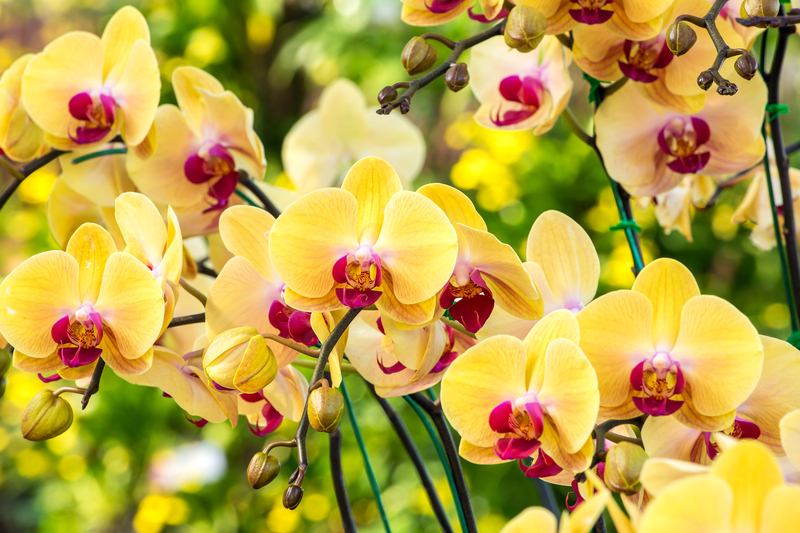New to Gardening? Start with These 9 Key Tips
Posted on 21/08/2025
New to Gardening? Start with These 9 Key Tips
If you are new to gardening, you might feel both excited and overwhelmed. The prospect of nurturing your own green space is thrilling, but where should you begin? Whether you want to grow beautiful flowers, a lush lawn, or tasty vegetables, some simple approaches can lead you toward becoming a confident beginner gardener. In this comprehensive guide, we'll walk you through nine essential gardening tips for absolute beginners, ensuring that your first foray into horticulture is both rewarding and successful!
1. Understand Your Climate and Garden Space
One of the most important tips for those starting out in gardening is to get to know your environment. Before you plant a single seed, take time to assess your climate and identify what will thrive in your region.
- Learn your USDA Plant Hardiness Zone: This tells you which plants will survive year-round in your area.
- Observe sunlight patterns: Watch your garden spot throughout the day. Most vegetables and flowers require at least 6 hours of sun for optimal growth.
- Check your soil type: Is it sandy, clay, loamy, or rocky? Conduct a simple soil test to determine its acidity/alkalinity and nutrient levels.
Pro tip: Local garden centers often provide free guides or workshops to help beginner gardeners understand their unique conditions.

2. Start Small and Build Your Knowledge
If you are new to gardening, enthusiasm can lead to biting off more than you can chew. Avoid burnout by starting with a small garden plot or a few containers. As you build confidence and learn from experience, you can expand your garden year after year.
Advantages of Starting Small
- You can easily manage and care for a small area
- It's less expensive and time-consuming
- Helps you focus on learning correct methods before scaling up
- You'll feel less pressure if you make beginner mistakes
3. Choose Easy-to-Grow Plants for Beginners
Not all plants are created equal when it comes to difficulty. If you're new to home gardening, select robust, easy-to-grow varieties. This increases your chances of success and makes gardening more enjoyable.
Great Choices for Beginner Gardeners:
- Vegetables: Lettuce, radishes, bush beans, cherry tomatoes, and zucchini
- Herbs: Basil, parsley, chives, mint, and oregano
- Flowers: Marigolds, sunflowers, nasturtiums, zinnias, pansies
Check your seed packets or plant labels for information on growing conditions and maturity dates.
4. Invest in Quality Tools and Supplies
Every novice gardener needs a basic toolkit. Gardening doesn't require a big budget, but selecting several quality, ergonomic tools will make your tasks easier and protect against strain or injury.
Beginner Gardener Tools Checklist:
- Trowel or hand shovel
- Pruning shears or garden scissors
- Watering can or hose with adjustable nozzle
- Sturdy gloves
- Garden fork or small spade
- Bucket or kneeling pad
Keep your tools clean to avoid disease transmission between plants, and store them in a dry place to prevent rust.
5. Master the Basics of Planting
Planting correctly is a vital aspect of successful beginner gardening. Follow these fundamental steps every time you add something new to your garden:
- Read the plant label: Note sunlight, spacing, and water preferences.
- Prepare the soil: Loosen it with a fork, add compost or organic matter if possible.
- Plant at the right depth: As a rule, seeds should be planted at a depth two to three times their diameter; transplants should be set at the same depth as in their original pot.
- Water gently: Water new plantings with a soft spray so you don't wash away seeds or compact the soil.
Remember: Good soil is the foundation of gardening success. Rich, loose soil full of organic matter helps retain nutrients and moisture.
6. Water Wisely and Don't Overdo It
One common mistake for those new to gardening is overwatering. Plants need regular moisture, but soggy soil can cause root rot and diseases.
Essential Watering Tips for New Gardeners:
- Check soil moisture: Stick your finger an inch into the soil. If it feels dry, water. If it's damp, wait.
- Water early in the day: Reduces evaporation and helps prevent diseases that occur with overnight moisture on leaves.
- Water deeply, not just the surface: This encourages roots to grow downward and makes your plants more drought-resistant.
- Mulch around your plants: Mulch helps keep soil moist, reduces weeds, and improves your soil's health over time.
Tip: Investing in a simple drip irrigation system can make watering easier for busy beginners.
7. Feed Your Plants for Maximum Growth
Plants need more than just water and sunlight to flourish. Providing them with the right nutrients is key for healthy, vigorous growth.
- Start with compost: When you begin gardening, mix compost into your soil. Homemade compost or store-bought works well.
- Use balanced fertilizers: Choose a fertilizer appropriate for your plants--vegetables, flowers, or shrubs.
- Follow instructions: Too much fertilizer can burn your plants. Read and follow package instructions carefully.
Organic options like compost and manure are great for enriching your soil naturally.
8. Keep an Eye Out for Pests and Diseases
Even the most seasoned gardeners face challenges from pests, diseases, and weeds. Being vigilant and proactive can save your garden from trouble.
- Regularly inspect your plants: Look for holes in leaves, discoloration, or insect activity.
- Learn to identify good bugs: Ladybugs and lacewings feed on pests and help keep your garden healthy.
- Try organic controls first: Hand-picking pests or using neem oil or insecticidal soap are effective for many beginner gardening problems.
- Remove weeds early: Pull weeds when they are small to prevent them from competing with your desired plants for water and nutrients.
Beginner tip: Keep a gardening journal to track what works (and what doesn't) when it comes to pest management in your new garden.
9. Be Patient and Enjoy the Process
One of the best gardening tips for beginners is to embrace the learning curve. Gardens grow slowly, and so will your skills. Each day, observe the small changes and enjoy your time outdoors.
- Remember, mistakes are part of the process. Every new gardener has a failed plant or two!
- Celebrate your successes--harvest a cherry tomato or cut your first bouquet with pride.
- Connect with others. Try local gardening groups, online communities, or neighbors for advice and encouragement.
Gardening is as much about the journey as the destination. The sense of accomplishment you feel when something beautiful blooms, or when you taste your first homegrown vegetable, is worth every ounce of effort!

Bonus: Resources for New Gardeners
Still feeling uncertain? There are abundant resources to help first-time gardeners:
- Local cooperative extension offices
- Community gardens
- Master Gardener programs
- YouTube channels and gardening blogs
- Books and magazines focused on gardening for beginners
Conclusion: Your Successful Gardening Journey Starts Here!
Becoming a gardener doesn't happen overnight, but these nine key tips will steer you in the right direction. Understanding your environment, choosing the right plants, and adopting careful gardening practices will ensure you start strong and continue growing--both in your garden and your knowledge.
Are you ready to dig in? With patience, persistence, and passion, anyone can develop a green thumb. Whether your space is a sunny balcony or an open backyard, the joy of gardening awaits you. Get started today and watch your little patch of earth come to life!
We hope you found these beginner gardening tips helpful. If you have questions or want to share your progress, drop us a comment below. Happy gardening!
Latest Posts
Weed-Free Gardening: 3 Strategies for Success
Designing Stunning Gardens through Hedge Trimming Shapes
Create Lush Landscapes with Vertical Gardening

